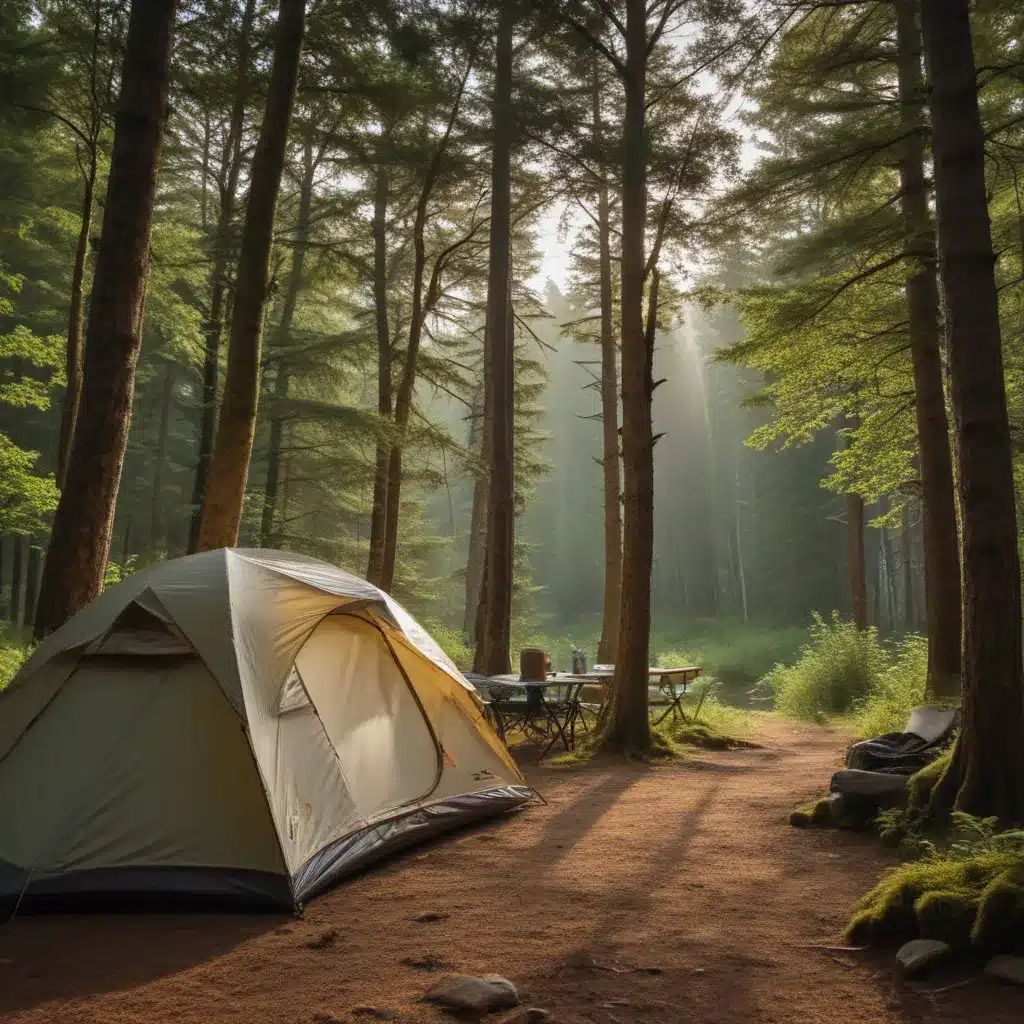
Conquering the Wilderness with a Light Footprint
The crisp, earthy scent of pine envelops me as I step out of the car, my hiking boots crunching against the gravel. Before me, the majestic peaks of the Scottish Highlands rise, their rugged beauty beckoning me to explore. As I take a deep breath, I can’t help but feel a sense of exhilaration – this is where I’m meant to be, surrounded by nature’s grandeur.
But with that excitement comes a responsibility. You see, I’m on a mission to camp in a way that minimizes my impact on this precious landscape. Because while the great outdoors may seem boundless, the truth is, we must tread carefully to preserve its delicate balance. That’s why I’m here to share my hard-earned lessons on eco-friendly camping – strategies that will help you reduce your footprint and leave no trace, so that generations to come can marvel at the unspoiled wonder of the Scottish Highlands.
Rethinking Your Camping Gear
When it comes to eco-conscious camping, the first step is to take a long, hard look at your gear. After all, the equipment you bring can make all the difference in how sustainable your adventure is.
Let’s start with the basics – your tent and sleeping setup. Instead of purchasing brand-new gear, consider renting or sharing equipment with friends. Not only is this more cost-effective, but it also keeps perfectly good gear out of landfills. And if you do need to buy new, seek out sustainable brands that use recycled or organic materials.
But your gear choices don’t stop there. When it comes to everything from cooking supplies to hygiene products, it’s crucial to opt for non-toxic, biodegradable alternatives. Think bamboo utensils, compostable plates, and natural, eco-friendly sunscreens and bug sprays. These small swaps can have a big impact on reducing waste and chemical pollution.
Mastering the Art of Minimal Impact
Of course, eco-friendly camping isn’t just about what you bring – it’s also about how you behave once you’re in the great outdoors. That’s where the Leave No Trace principles come into play. These guidelines are like a secret code for wilderness warriors, helping us tread lightly and preserve the natural beauty around us.
One of the most important tenets is to plan ahead and prepare. Before you even set foot on the trail, research your campsite and familiarize yourself with the local regulations. Are there any sensitive ecosystems to avoid? What are the best practices for human waste disposal? Asking these questions ahead of time will ensure you’re ready to minimize your impact from the moment you arrive.
And speaking of human waste, that’s a crucial consideration for the eco-conscious camper. Bury or pack out your waste properly, and never, ever leave behind any toilet paper or other refuse. This may seem like a hassle, but trust me, it’s worth it to preserve the pristine beauty of your surroundings.
Fueling Your Adventure, Sustainably
As any seasoned camper knows, food and fuel are essential for powering our outdoor adventures. But did you know that the way we approach these necessities can also have a significant impact on the environment?
When it comes to cooking, ditch the campfire and opt for a camping stove instead. Not only are these devices more efficient, but they also reduce the strain on natural resources like wood. And if you really want to go the extra mile, choose a stove that runs on sustainable biofuel.
As for the food itself, homemade meals and snacks are the way to go. Not only will you avoid the waste and environmental impact of pre-packaged goods, but you’ll also have the satisfaction of crafting your own delicious, eco-friendly sustenance. Just remember to minimize disposable packaging and properly dispose of any food waste.
Leaving a Legacy of Stewardship
At the end of the day, eco-friendly camping isn’t just about what you do in the moment – it’s about the lasting impact you leave behind. And that’s why it’s so important to consider the bigger picture, from choosing your campsite to supporting conservation efforts.
When selecting a place to pitch your tent, look for campsites that prioritize sustainability. These might have features like solar-powered amenities, proper recycling facilities, or restrictions on vehicle access. By choosing these eco-conscious destinations, you’re not only reducing your own impact, but also encouraging the wider outdoor community to follow suit.
But your contribution doesn’t have to stop there. Consider volunteering your time or resources to local conservation projects, or even just donating to organizations that protect the wilderness. After all, the Scottish Highlands didn’t become the breathtaking landscape we know and love today by accident – it took the dedication of countless passionate stewards. And by joining their ranks, you can help ensure that this natural wonder remains unspoiled for generations to come.
Embracing the Eco-Conscious Adventure
As I zip up my tent and gaze out at the rolling hills, I can’t help but feel a sense of pride. Sure, eco-friendly camping may require a little more thought and preparation, but the payoff is worth it. By treading lightly and respecting the land, I know I’m leaving behind a legacy of conservation – one that will allow others to experience the same awe-inspiring beauty that I’m privileged to enjoy today.
So, whether you’re a seasoned outdoor enthusiast or a newbie to the world of camping, I encourage you to embrace the eco-conscious adventure. Pack your sustainable gear, follow the Leave No Trace principles, and get ready to immerse yourself in the untamed splendor of the Scottish Highlands. Trust me, your planet-friendly approach will only enhance the magic of your experience.
After all, the great outdoors belongs to all of us. Let’s work together to keep it that way.

